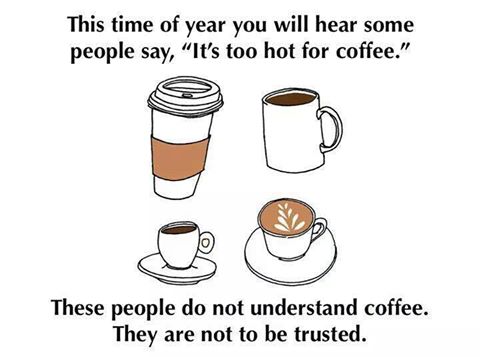Low-Caffeine Pregnancy: Can I Survive?

Coffee drinkers of the world – unite! Has a morning really begun if the requisite cuppa has not yet been drunk? And by cuppa, we mean coffee with caffeine. Nothing from that green-capped decaf container, no fancy-flowery herbal teas, no hot purified water with fresh-squeezed organic lemon, thank you very much. We’re talking coffee, plain and simple, before tackling any task – any task at all! Whether straight-up instant, brewed, espresso, latte, or cappuccino – we want that cuppa, hands down, no questions asked.
Well, at least that’s how we felt before we got pregnant. And started reading all the pregnancy advice out there. Which inevitably says reduce caffeine consumption. Uh oh. That’s us. Like alarm bells going off incessantly, we are constantly bombarded with all those pregnancy “no-no’s” – alcohol, too much sugar, processed foods, raw fish, alfalfa sprouts, Brie cheese – the list is exhaustive. But it’s the morning coffee that really gets to us – seriously – alfalfa and Brie we can drop, but coffee? Is it really that bad for my baby?, we wonder.
The bottom line is yes, it could be. First trimester miscarriage, preterm contractions, preterm birth, low birth weight, and even birth defects are associated with too much caffeine. It’s a stimulant and a diuretic, meaning it raises blood pressure and heart rate, and makes you urinate more frequently, possibly resulting in dehydration. Not pleasant for the baby, to say the least.
While no one can tell you with absolute certainty that a particular amount of caffeine could harm your pregnancy and/or your baby, based on the studies that have been done, we recommend a specific daily maximum amount of caffeine.
It’s 100 mg.
Now, take a deep breath. And smile.
Because 100 mg is not caffeine-barrenness. It is not no morning coffee for an entire nine months.
In fact (drum roll, please), 100 mg of caffeine is the approximate amount of caffeine in one brewed cup of coffee! Can you hear the audience cheering? Do you see the skies opening up? Do you feel free to be you and me? Read: You can have your coffee while pregnant, and drink it too.
To be sure, not all coffees are treated equal in terms of caffeine. Here’s a list of the average amounts of caffeine in a variety of different types of coffee:
Brewed coffee – 8 oz.: 95 mg
One espresso shot: 63 mg
Note: This includes lattes, cappuccinos, macchiatos and Americanos because they all tend to have one shot of espresso.
Instant coffee – 8 oz.: 30–90 mg
Caveat: Commercial chains, such as StarBucks and Dunkin’ Donuts, sell coffee with much higher amounts of caffeine. You can either ask them to show you the ingredient lists including the level of caffeine, or simply buy a small-sized coffee, and split it with a friend. Drink it slowly, methodically, and consciously, and you won’t even notice it’s a smaller amount. Yes, for real. Try it.
Caffeine in Other Drinks
Coffee is one thing, but we need to be aware of how much caffeine is in other drinks. Here are some averages:
Decaf coffee, 8 oz. (yes, it still has some caffeine): 3-10 mg
Soft Drinks, 12 oz.: 23-69 mg
Black Tea, 8 oz.: 47 mg
Chocolate Could Compete for Your Coffee
Surprise, surprise – chocolate is chock-full of caffeine. In fact, a brown chocolate, 160-gram bar (45-59% cocoa) contains 70 mg of caffeine. If this is going to compete for your daily dose, try white chocolate – it’s virtually caffeine-free.
Or play around with a bar of chocolate and a decaf coffee – or even go mocha and drop a few squares of the chocolate* into the decaf – hey, you might even like it better.
The bottom line is that not only will you be able to have a cup of coffee (or a chocolate bar) remain in your routine, you might even realize that you are fine without it. Try different things out, because remember, you’re in this together with your baby.
______________
*For diabetics or women diagnosed with gestational diabetes, high-sugar products, such as chocolate, are not recommended.
